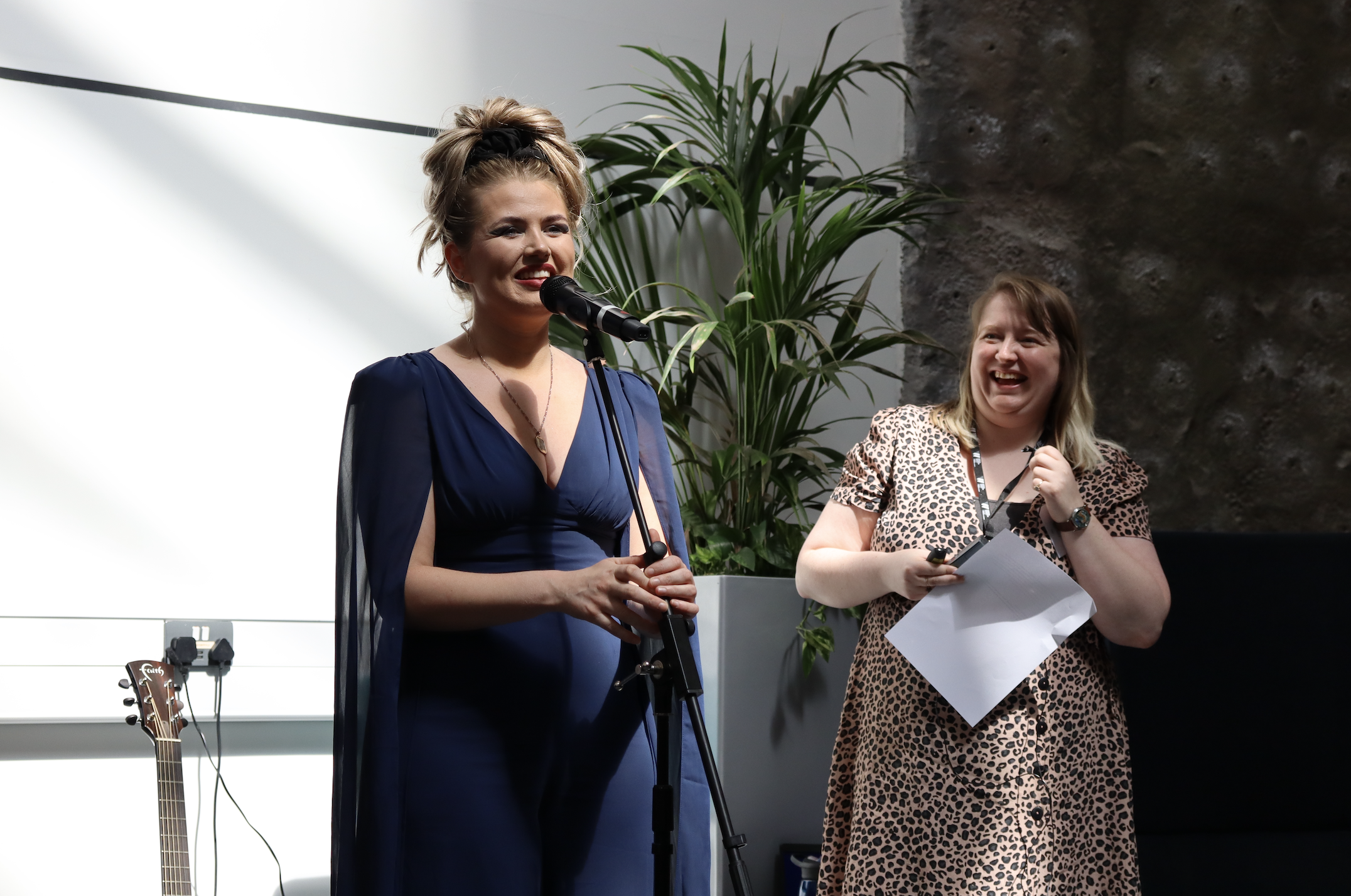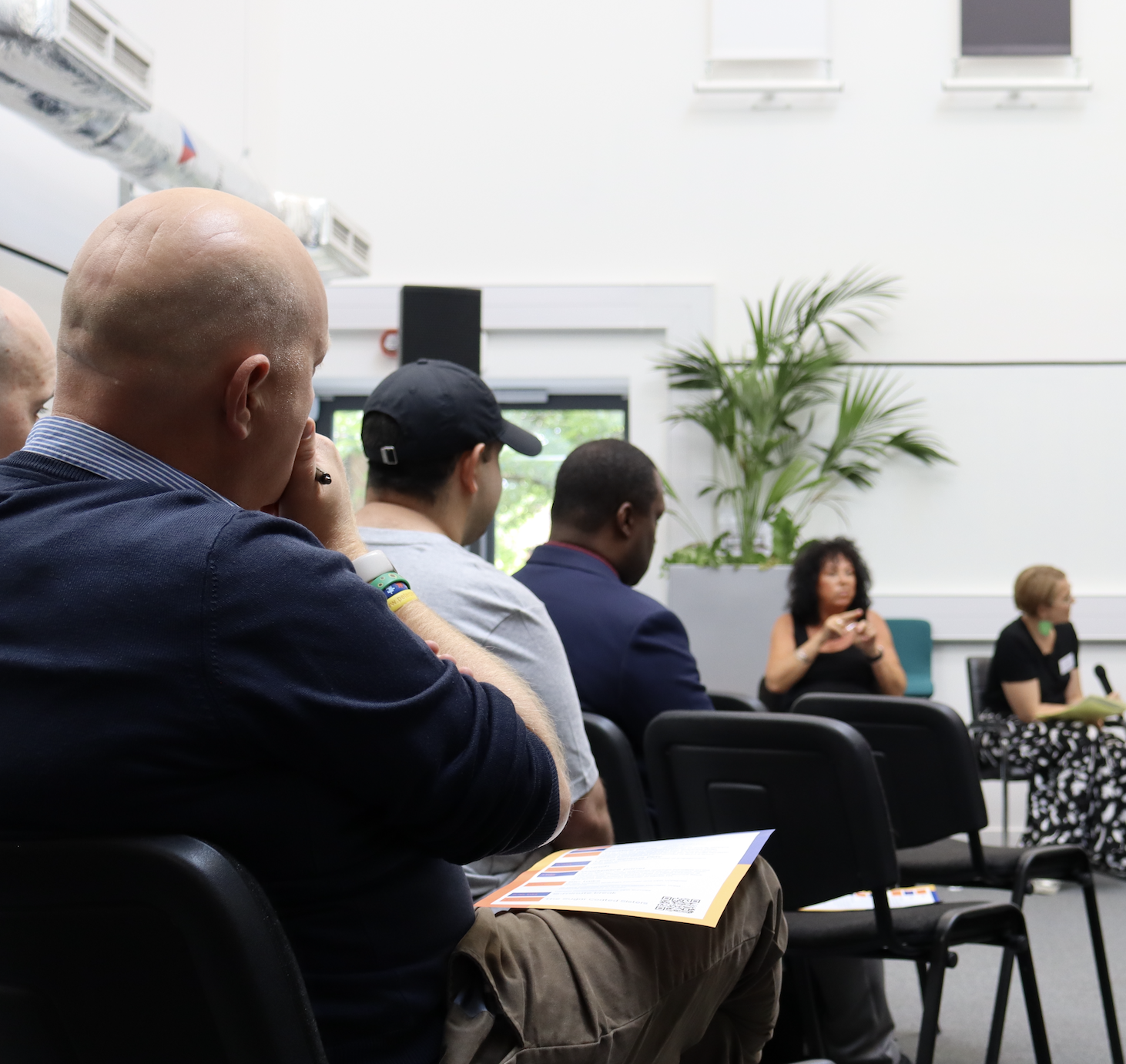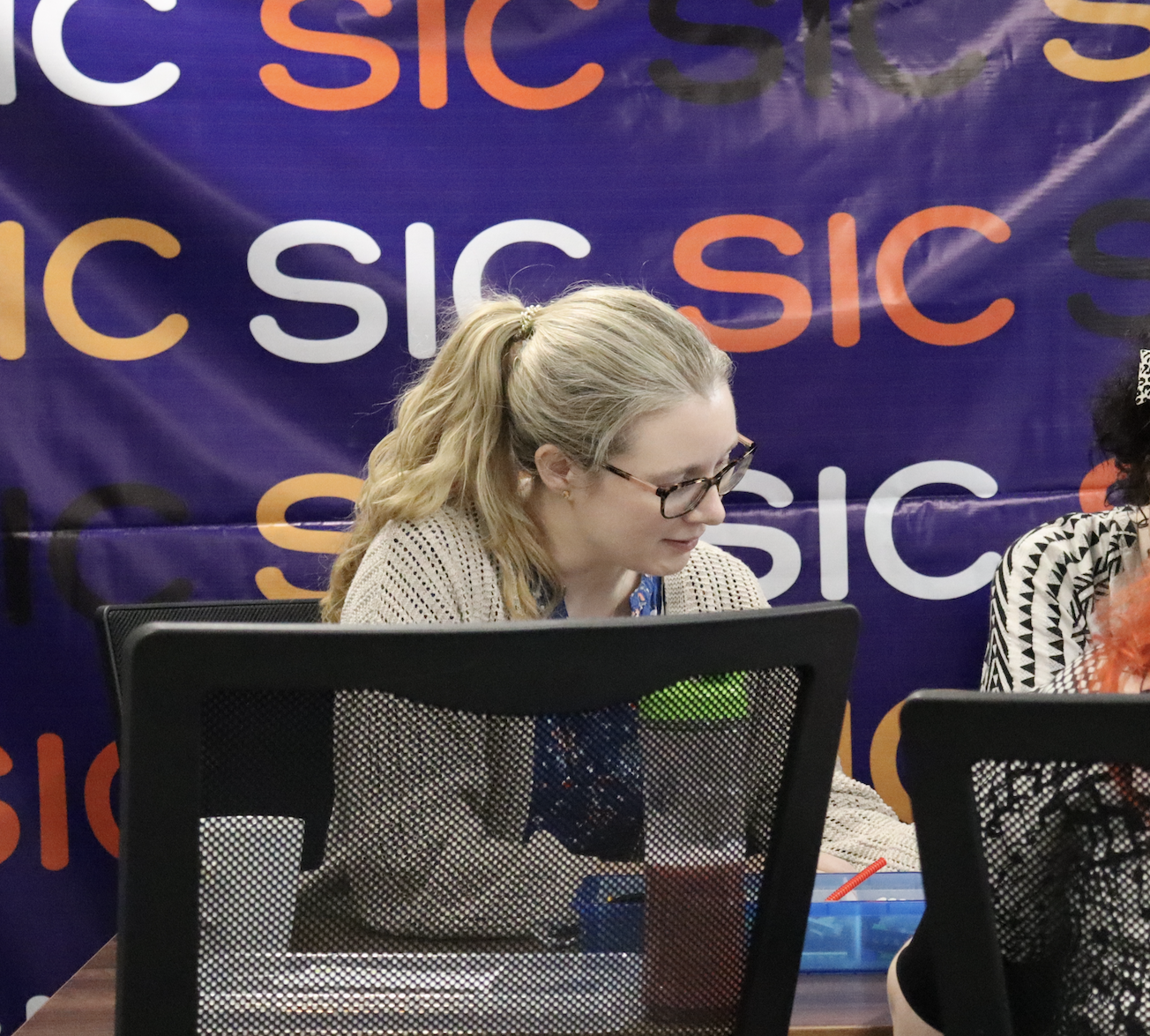7 key insights from the SIC Conference
Last month we hosted our first in-person conference all around accessibility in the workplace.
Taking place at University of Warwick, the event featured speakers from a range of industries and backgrounds, from medical to marketing, CEOs of successful start-ups to Heads of DEI at leading organisations.
What did our attendees learn from the day of exciting panel talks, hands-on workshops, and a musical comedy performance from chronically ill TikTok stars? And how can these learnings inspire the next wave of accessible and inclusive working?
Here are our seven key insights from the SIC Conference.
Image 1: Chloe from the Sugar Coated Sisters speaking into a microphone. Image 2: A person sat at a table building a lego model. Behind them is a large dark blue backdrop with the SIC logo printed repeatedly over it in white, light orange, dark orange and black. Image 3: A busy seated audience facing a row of panel speakers.
1. The value of creativity
The day began with a panel discussion on creativity: what it actually is, how it serves to problem-solve, and what this can mean for an organisation.
Led by Alice Reeves (Founder of Joyfully Different) and featuring Dr Zoe Watson (Founder and CEO of Wellgood Wellbeing), Leon Killin (Head of Inclusion & Belonging at Sumo Group plc) and Emilia Moniszko (Brand strategist and founder of Blunt & Brave), the panel unpacked their own definitions of creativity.
Dr Zoe said “Creativity is a verb. It’s not a talent that’s thrust upon us”, which sparked Emilia to add that creativity is not only something for typically artistic practices, “[it’s also] a problem-solving discipline”.
Emilia went on to relate this to disabled employees. “Disabled and neurodiverse people have to be creative to be able to function”; it’s a skill that this community has as a default.
In a tall room with white walls, a BSL interpreter sits at the side of a panel of Alice Reeves, Emilia Moniszko, Dr Zoe Watson and Leon Killin, who are sat on chairs. Alice, Zoe and Leon are looking at Emilia who is speaking into a microphone.
2. Criticism is a gift
There’s often a reluctance from businesses to even try to create an accessibility policy in the first place as the fear of getting it wrong overwrites the moral need for one.
When speaking on accessibility policies and best practices, Leon from Sumo Group advised businesses: “Don’t be afraid of getting it wrong, and don’t be afraid to not get it perfect. Criticism [...] is a gift. It can be like a hot potato. Hold it - it’s hot at first, but then it cools down”.
Disabled applicants and employees aren’t looking to find the quickest way to cancel your organisation; they’ll be able to smell fake accessibility from a mile off, but if the intentions are from a place of care and real value for inclusion, then you need to welcome the criticism with open arms. We can’t learn if we don’t have anything to learn from.
3. The key to innovation
Exclusively employing people with the same background, education and work experience boils down to the same strategies and thought patterns being used in your business over and over again.
If you want to achieve new methods and ideas in your company, diversifying your workforce is paramount.
Disabled, neurodiverse and chronically ill people bring such a broad scope of experience and skills to the workplace. Speaking on our afternoon panel, Robin Christopherson (Head of Digital Inclusion at AbilityNet) said “Often, disabled people are more qualified for jobs than their non-disabled counterparts peers as they’ve had to work harder”.
As Emilia on our creative panel said “When you put different people with different skill sets in the same place, innovation happens”.
4. Why you should be employing disabled people
Leading on from the above point, there’s no doubt that disabled people bring a completely different skill set and perspective to an organisation. Facing ableist barriers on a daily basis, managing energy, health and finances around a social life, education and work equips one with skills of problem-solving, resilience, and time management - all valued skills in any company.
There also continues to be many misconceptions surrounding disabled employees which employers need to reject, one of which is that they take too much sick leave. On our workplace panel, Robin Christopherson pointed out that in fact people with disabilities generally take no more or less sick leave than other employees.
Chair Alice Hargreaves concluded the workplace panel by asking the speakers what a disabled employee can bring to an organisation. Sonia Rai’s (Founder of Nectar HR) answer was succinct: “What can’t a disabled employee bring to an organisation?”
5. Hard work = success ?
Refusing to make the journey easier (for both yourself and your employees) doesn’t equate to better success. In fact, feeding the unhealthy narrative that hustle culture is admirable and the only way to a great career often only serves as a detriment to wellbeing and jeopardises one’s ability to work at their best.
A key example of this was highlighted in the CEO of Sumrise Dileepa Ranawake’s talk on the role of AI.
Dileepa debunked the myth that “hard work = success” by drawing on his own experience of being dyslexic and the benefits of using AI. He’s developed an app designed specifically for dyslexic and ADHD thinkers to ease the challenge of writing, organising and responding to emails, something which can be daunting and energy-draining to most neurodiverse people.
As AI has been perceived by some as lazy, it’s important that current employers recognise the power both AI and other learning tools have in bridging the access gap.
Dileepa Ranawake stood in front of a tv screen, speaking into a hand held microphone. On the tv screen is a photo of an open laptop.
6. Employee wellbeing is human wellbeing
Another talk from the day which gave food for thought was Dr Zoe Watson’s talk: ‘All Fur Coat and Nae Knickers’ (the meaning of the title roughly mirroring ‘All the gear and no idea’). Zoe is an NHS GP and founder of Wellgood Wellbeing, a wellbeing resource provider with the stupendous log line ‘Bullshit-free wellbeing, for busy people with busy brains’.
In her talk, Zoe stressed that employers are too invested in materialistic wellbeing (cue ping pong tables, desk yoga and office dogs) and are forgetting that “employee wellbeing is human wellbeing”.
As lovely as an office Pomeranian would be, it is simply a paint stroke over the cracks in a workforce. If employers can’t recognise that, their employees definitely can. Humanistic approaches are quickly bettering outdated ones (such as hustle culture) so why not get ahead of the game and invest in real and effective wellbeing practices like flexible working and employer/employee trust? Plus - there’ll be no dog poo!
7. ‘Disabled’ isn’t a bad word
“Don’t be afraid to talk about disability. Ask”. That’s some of Robin Christopherson’s advice to businesses wanting to work with disabled people.
As we come to the end of Disability Pride Month 2023, it's important to remember the brilliance and joy that comes from the disabled community.
Too often disabled people are labelled as a burden on resources, unproductive, and unuseful to society, but employers often forget that 1 in 5 of the working-age population is disabled. If you think you don’t have any disabled, chronically ill or neurodiverse people working for you, you probably do.
Creating a space where your employees feel safe in sharing their access needs, where they trust that you are doing your best to accommodate them doing their best - that’s the first step to becoming a truly inclusive employer.
Highlighting the sheer joy and pride of the disabled community, the day ended with a special performance by none other than TikTok stars the Sugar Coated Sisters. Real-life sisters Chloe and Tabby shared stories of their chronic illnesses (Chloe is bipolar and Tabby has Type 1 Diabetes) through hilariously composed musical stories. Their opening act alone had us grinning from ear to ear.
Performers Tabby and Chloe are stood in front of microphones on stands. Tabby, on the left, is wearing a long pink jumpsuit with a flowing cape and Chloe, on the right, is wearing a matching outfit but in blue. They both have their arms in the air.
Inspired by these key insights? Looking to better your equality, diversity and inclusion strategy to include disability and health? Have a chat with SIC Founder Alice to find out more about our bespoke consulting services.






